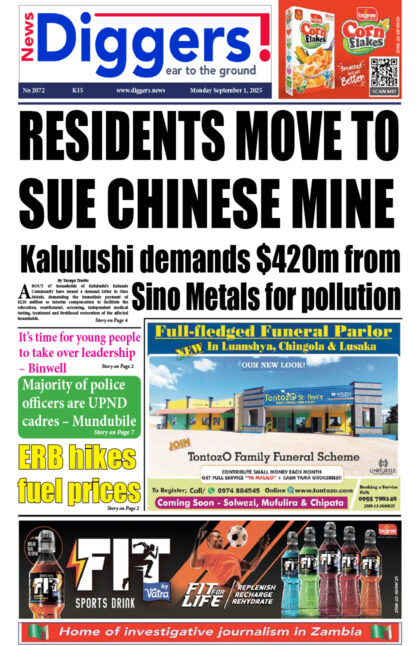Economist Professor Oliver Saasa has advised government to cut allowances for public workers to reduce the huge expenditure on emoluments.
And Prof Saasa says retaining the Value Added Tax (VAT) system is “icing on the budget”.
Meanwhile, the Premier Consult managing director says it was irresponsible of Zambia Revenue Authority (ZRA) commissioner general Kingsley Chanda to back the sales tax introduced in the 2019 national budget in the absence of a study to substantiate their claims.
In an interview, Prof Saasa has urged the government to cut down its expenditure as it implements austerity measures amidst the dwindling economy.
“The second part is really cutting down on public expenditure on, for example, salaries. I would like to see a situation myself where allowances of government workers are skimmed to the bone beyond the salary. There is so much that goes for conferences, workshops, international travel which I think it’s important to talk about but there is so much that also happens but those don’t usually come in the budget so I didn’t expect them to. So what we are going to see now is us just urging our colleagues, particularly the Ministry of Finance, our colleagues in cabinet, ministers, to be resourceful, firstly in how they cut down their appetite for expenditure in areas where we can do more with less. But doing more with less means that you have to apply prudential application of fiscal management, resources, you have to be very careful like if you want to buy something, find the cheapest source, get only what is required for that particular time, be less swift in your appetite and in your expenditure, that does not, of course, come easy,” Prof Saasa said.
He, however, commended the minister for coming up with a “fair budget” but noted that “it still needs to be touched on to allow changes to sector expenditure”.
“This is really what we talk about – austerity measures. This is really what it meant; there is no money. So you can criticize him, ‘you should have done this or that’ but the bottom line is that they didn’t have sufficient money. Of course we can still debate and I think we should continue debating as to whether when it gets to parliament, we have not paid sufficient attention to ‘rejigging’ the budget in terms of allocations to the different sectors. There are definitely legitimate concerns regarding how much, for example, the military or the defense forces get as opposed to social service expenditure at a time when we don’t have a major threat outside. But you can still actually make a cage for…actually, can we rearrange a bit, that’s the change that should be made,” Prof Saasa said.
“Generally, I think it’s a fair budget under the circumstances for the simple reason that as I did say in my article just before, I put in a satirical form ‘minister without finance. That’s was speaking to the depletion of options by government, where you are going to budget already clear that 90.1 percent of the budget from domestic resources is already earmarked for payments to debt servicing and the balance for paying workers. So really, you are talking about from domestic resources, the honourable Minister of Finance going without money with only about 10 per cent to sprinkle over the entire budget for the country, for a whole year. Of course that is a bit of an exaggeration, a budget is not consisting only of domestically generated revenue, a government does have avenues at two different levels, domestically…but of course, you have seen in the budget, there is a restraint on that, less than two per cent they are targeting, good luck to them. And I am not so sure whether they can meet that but also borrowing externally.”
And Prof Saasa has said the biggest triumph for business stakeholders was the government’s decision to abandon the sales tax.
“My biggest jubilation has been what I see as a reward for those, including myself, that fought very hard against the introduction of sales tax. My position is very well known in the public domain. We fought hard, and when I saw that we were heading towards VAT and ultimately it was announced, for me that was music to my ears because fundamentally, nobody says that VAT has no problem. Of course it has problems and I can make my statements very clear in the media as to why it has to be improved upon and that’s the option that the minister has taken. For now, it’s dead and buried, it might resurrect if you believe in reincarnation but for me, what this decision meant for me, it is that it’s the icing on the budget,” Prof Saasa said.
He said the ZRA needed to reconsider its thought process to avoid supporting proposals that have not been clearly studied and understood.
“…the manner in which the ZRA commissioner general was pushing it (sales tax) was in my view irresponsible. I think that we need to reengage the thought process at ZRA to make sure that we do not jump into systems and processes that we have not invested sufficient energies and resources to understand the implications. There was no study to my knowledge that was undertaken that justified why the commissioner general of the ZRA maintained the position that he had, especially where information from experts in this field suggests very clearly that there are challenges that need to be understood and I am very happy that Honorable Minister of Finance [Dr Bwalya Ng’andu] indicated that we have to undertake studies to understand it before we can look at it as an option,” advised Prof Saasa.
























